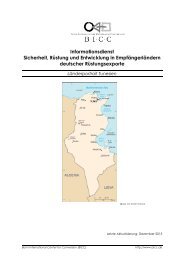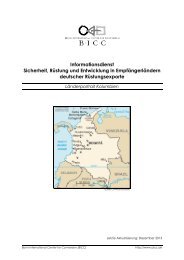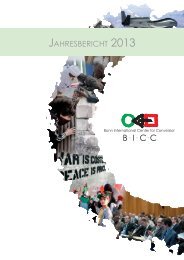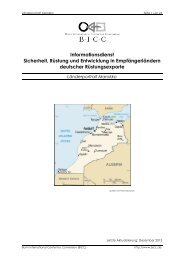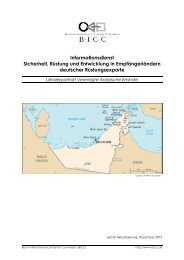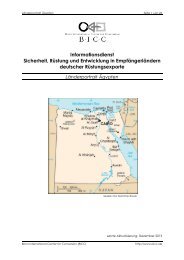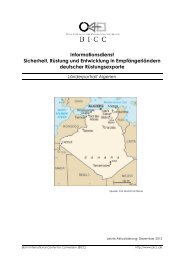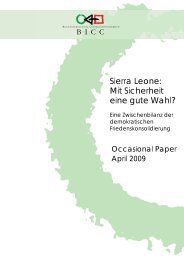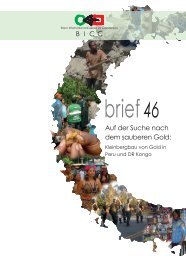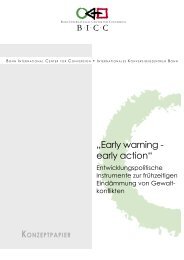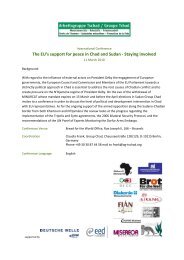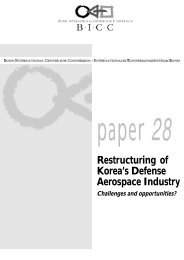English - BICC
English - BICC
English - BICC
You also want an ePaper? Increase the reach of your titles
YUMPU automatically turns print PDFs into web optimized ePapers that Google loves.
Box E: The IRA arms statement in full, 23 October 2001<br />
The IRA is committed to our<br />
republican objectives and to the<br />
establishment of a united Ireland based<br />
on justice, equality and freedom.<br />
In August 1994, against a backdrop of<br />
lengthy and intensive discussions<br />
involving the two governments and<br />
others, the leadership of the IRA called<br />
a complete cessation of military<br />
operations in order to create the<br />
dynamic for a peace process.<br />
‘Decommissioning’ was no part of<br />
that. There was no ambiguity about<br />
this.<br />
Unfortunately there are those within<br />
the British Establishment and the<br />
leadership of unionism who are<br />
fundamentally opposed to change.<br />
At every opportunity they have used<br />
the issue of arms as an excuse to<br />
undermine and frustrate progress.<br />
during the 1990s. Reviewing patterns<br />
and mechanisms by which the process<br />
of negotiation and implementation of<br />
disarmament initiatives was fostered or<br />
hindered offers a number of lessons<br />
for both the ongoing peace process in<br />
Northern Ireland and for other<br />
conflict-stricken regions confronting<br />
comparable dilemmas.<br />
In search of solutions to problems of<br />
post-war consolidation, such as how to<br />
find ways out of protracted violence,<br />
studies of the varying methodologies<br />
for managing peace processes have<br />
become increasingly popular in<br />
international peace and conflict<br />
research, with particular emphasis on<br />
the case study of Northern Ireland<br />
(Darby and Mac Ginty, 2000, and<br />
2002). Benefits and limitations of the<br />
comparative perspective have, with<br />
respect to Northern Ireland, recently<br />
been explored in a comprehensive<br />
It was for this reason that<br />
decommissioning was introduced to<br />
the process by the British Government.<br />
It has been used since to prevent the<br />
changes which a lasting peace requires.<br />
In order to overcome this and to<br />
encourage the changes necessary for a<br />
lasting peace the leadership of Oglaigh<br />
na hEireann has taken a number of<br />
substantial initiatives.<br />
These include our engagement with the<br />
IICD [decommissioning body] and the<br />
inspection of a number of arms<br />
dumps by the two International<br />
Inspectors, Cyril Ramaphosa and<br />
Martti Ahtisaari.<br />
No one should doubt the difficulties<br />
these initiatives cause for us, our<br />
volunteers and our support base. The<br />
Political process is now on the point of<br />
collapse.<br />
academic publication (McGarry, 2001).<br />
Partisan studies drawing dubious<br />
parallels, with instrumental advantage<br />
for one of the respective sides in a<br />
conflict, have been a common feature<br />
of the ongoing political debate and<br />
dialogue surrounding the peace process<br />
in Northern Ireland (Magginnis, 1999).<br />
For example, the difficulties<br />
encountered by the South African<br />
peace process in putting paramilitary<br />
“guns beyond use” has—for all parties<br />
in Northern Ireland in different ways<br />
and at different times—served as an<br />
alluring precedent from which to draw<br />
lessons (O’Malley, 2000).<br />
Placing Northern Ireland in an<br />
international context to show that<br />
decommissioning was not a problem<br />
unique to the province of Ulster and to<br />
demonstrate how others “got it right”<br />
(Belfast Telegraph, 19 May 2000) only<br />
B·I·C·C<br />
guns out of politics<br />
Such a collapse would certainly and<br />
eventually put the overall peace process<br />
in jeopardy.<br />
There is a responsibility upon everyone<br />
seriously committed to a just peace to<br />
do our best to avoid this.<br />
Therefore, in order to save the peace<br />
process we have implemented the<br />
scheme agreed with the IICD in<br />
August.<br />
Our motivation is clear.<br />
This unprecedented move is to save<br />
the peace process and to persuade<br />
others of our genuine intentions.<br />
Signed: P O’Neill<br />
Source: BBC News, 23 October 2001,<br />
http://news.bbc.co.uk/hi/english/uk/<br />
northern_ireland/newsid_1615000/<br />
1615957.stm.<br />
does limited justice to the historical,<br />
regional and political specifics of a<br />
particular case. We are taking the<br />
reverse approach here. With the<br />
knowledge of comparable cases of<br />
international conflict resolution in<br />
mind we want to return for a moment<br />
to look at the specific dilemmas<br />
plaguing Northern Ireland and begin<br />
our assessment from there.<br />
Guns out of politics or<br />
politics out of guns?<br />
After the end of the Cold War,<br />
disarmament of paramilitary and<br />
militia groups as well as state forces has<br />
been crucial to almost all efforts to end<br />
internal conflict in parts of Africa,<br />
Central America and Southeast Asia.<br />
Decommissioning, which in some<br />
cases has been incorporated into<br />
programmes to demobilise and<br />
51



